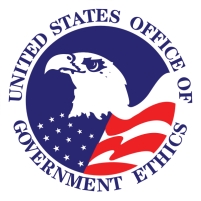The Office of Government Ethics is updating its executive branch ethics program to clarify and codify responsibilities, and provide more flexibility for agencies to handle their own education and actions.
The proposed updates are the result of more than three decades of alterations, input and interpretation from agencies.
“The proposed revisions … draw upon the collective experience of agency ethics officials across the executive branch and the Office of Government Ethics as the supervising ethics office,” the proposed rule states. “They present a comprehensive picture of the executive branch ethics program, its responsibilities and its procedures, as reflected through 35 years of interpreting and implementing the Ethics in Government Act of 1978, as amended, as well as other applicable statutes, regulations, executive orders and authorities.”
Among the clarifications are the responsibilities of Designated Agency Ethics Officials (DAEOs). These include:
- Maintaining records of agency ethics program activities.
- Providing advice and counseling to prospective and current employees regarding government ethics laws and regulations, and providing former employees with advice and counseling regarding post-employment restrictions applicable to them.
- Taking appropriate action to resolve conflicts of interest and the appearance of conflicts of interest, through recusals, directed divestitures, waivers, authorizations, reassignments, and other appropriate means.
The proposed rule also allows each agency’s DAEO more flexibility when it comes to training in order to meet the needs of their employees.
Kate Belinski, a partner with Nossaman LLP and member of the firm’s Public Policy Practice Group, said that flexibility is “entirely consistent” with agency practice today. If anything, she said, “I almost wish they had impressed upon a little more that it should not be so different from agency to agency.”
“Implementation should not be so vastly different,” Belinski said. “I think there’s a need for flexibility because every agency is different, but … the DAEOs have broad discretion in how flexible, how lenient they are, in applying the laws. Because at the end of the day, they can basically waive some of the rules. They’re the ones who determine whether something is a widely attended gathering or not. That determination varies pretty widely from agency to agency. You can have the same event and one agency will say this qualifies as a widely attended gathering, and another agency will say nope, it doesn’t, there’s not enough diversity of interest, not a substantive component to this event, etc.”
Many of the changes have already been happening over time, Belinksi said, so this proposed rule would really just codify them.
“And then a lot of it is just reorganization,” she added. “I really appreciate the way they’ve organized it. I appreciate the way that … the roles have been more clearly delineated. Structurally it just makes a lot more sense than the way the rule was written in prior iterations.”
Another provision “modernizes” ethics training regulations by distinguishing between “‘verbal training’ and ‘written training,’ so that the key distinction will be between ‘live training’ and ‘interactive training.'”
“Interactive training may take a variety of forms, and training that satisfies the requirements for live training will also always satisfy the requirements for interactive training,” the proposed rule states.
Training is considered live if a person leads a “substantial portion” of it, even if part of the training is prerecorded.
“The presenter must respond to questions posed during the training and provide instructions for participants to submit questions after training,” the proposal states.
Interactive training means an employee being trained “is required to take action with regard to the subject of the training.”
“The required action must involve the employee’s use of knowledge gained through the training and may not be limited to merely advancing from one section of the training to another section,” the proposed rule states.
The changes also propose more freedom for agencies to tailor that content based on employee needs.
The update also provides more leverage for the OGE director when it comes to enforcement and compliance.
Under the new rule, the director could make informal contact with an agency through a notice “to identify the relevant issues and resolve them expeditiously.”
“The Office of Government Ethics has found that information resolution is often an appropriate and effective alternative to formal action because it involves agency ethics officials and other stakeholders in actively crafting and implementing a resolution.”
The updated rule would also require certain agency leaders to be briefed on ethics around the time of their appointment.
“It’s very internally focused on operations, so it’s not really anything that’s going to greatly affect the regulated community or internal stakeholders,” Belinski said. “It’s really internal to the U.S. government’s employees and how OGE interfaces and trains appointees, and interfaces with employees.”
OGE is accepting comments on the proposed rule through Aug. 5.
Copyright
© 2024 Federal News Network. All rights reserved. This website is not intended for users located within the European Economic Area.
